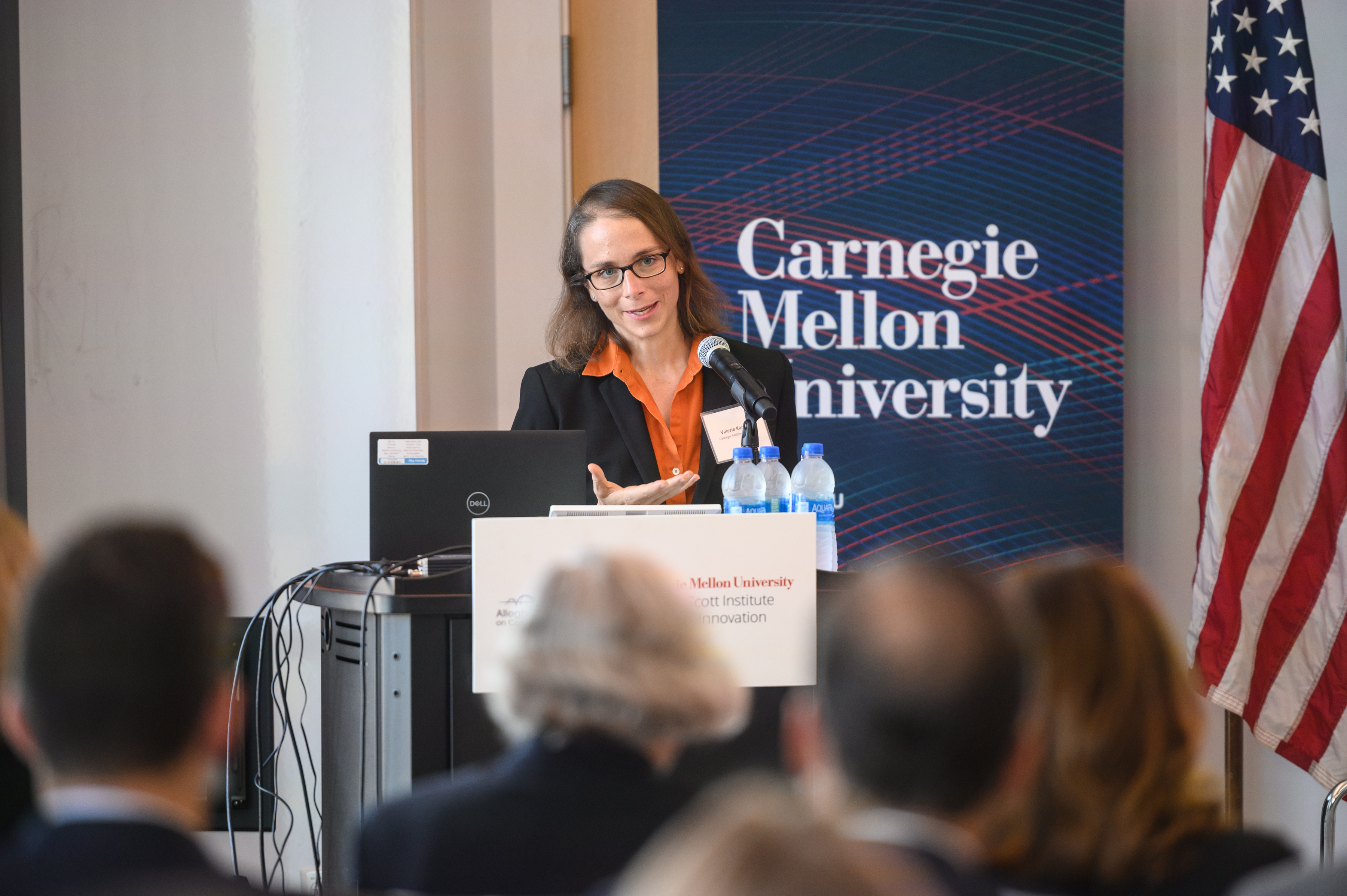
Faculty Feature: Valerie Karplus
By Alexandra Kramer, Kristen Whitlinger
Media Inquiries- Digital Communications Manager
Valerie J. Karplus is a current Scott Institute Faculty Affiliate and Associate Professor in the department of Engineering and Public Policy. Karplus has recently launched the Laboratory for Energy and Organizations (LEO), an initiative of the Wilton E. Scott Energy Institute at Carnegie Mellon University. This initiative aims to understand how energy producers and users are responding to climate change by mitigating GHG emissions from national and local policies, peers, suppliers and buyers, among other sources.
CMU has the unique capability to bring together experts from various disciplines throughout the institution who are currently doing research around the energy transition. “CMU and other academic institutions in the region can play an important role as an honest broker and convening partner,” says Karplus. “The goal is to solve the collective action problem, to bring people together to discuss what a clean energy future will look like.”
The Scott Institute and Karplus’s research group will be establishing a regional energy node for this project to carry on the work from the case study. Karplus says, “the goal is not to duplicate efforts but to close gaps and focus the conversation on what needs to be done instead of organizational turf wars which can get in the way of making progress on these issues.” The workforce dimension will be central to the analysis that will follow as part of the node at this event.
“There are many criteria that need to be considered when evaluating investments to enable an equitable transition. The goal of follow-on research that will build on this case study is to start with a few key areas including the workforce impact of clean energy transition in the region,” says Karplus.
Under the LEO Initiative, CMU and the Scott Institute will develop a program of research and engagement led by Karplus and other university faculty in the region. This program provides a space for conversations that draw on analysis of impacts of specific proposals and stakeholder views and preferences over outcomes. These conversations are conducted by the faculty and their Ph.D. students as well as engaged researchers at leading regional businesses. The objective of these research activities and associated conversations is to support regional leadership in realizing the transition and growth opportunities laid out above. Regional stakeholders will be invited to support this initiative.
Dr. Karplus is also involved in the Roosevelt Project, a project founded by former U.S. Secretary of Energy and President and CEO of the Energy Futures Initiative, Ernest Moniz. The Roosevelt Project is dedicated to engaging communities and stakeholders nationwide who might be at a disadvantage in the energy transition in order to develop policy priorities and action plans that will move beyond the divisive choice between economic growth and environmental security. The goal of this project is to shift to low carbon energy while emphasizing the inclusion of communities that may be highly specialized or dependent on the fossil fuel economy at a regional level.
The Roosevelt Project’s Southwestern Pennsylvania (SWPA) Case Study, which is a multi-year effort involving faculty and students at CMU, MIT, Harvard, and Boise State, shows how the ‘all-of-the-above’ approach to low carbon energy transition can invigorate the region’s economy, creating opportunity for all citizens and communities. The case shows the potential gains if regional leadership is able to develop a strategy and conversation around how to embrace this diversified path to a climate-secure future. Realizing these gains will require breaking down barriers and orchestrating unprecedented cooperation and coordination among diverse actors.

Karplus began working on this project in 2019, while at the MIT Sloan School of Management. She joined the Department of Engineering and Public Policy at CMU in September 2020 to pursue a thematic focus on the energy transition. She is a co-lead on the SWPA Case Study, and is leading the way for the regional rollout as a local faculty member. As a core faculty member in the Roosevelt Project, she will also be involved in the national rollout of all four case studies.
During her time at MIT, Karplus studied energy transition and its impacts on industry in a variety of contexts. Her prior work focused on the design and implementation of transportation energy policy in the United States and energy and climate policy in China. With the Roosevelt Project, she is examining prospects for a low carbon energy transition in the U.S. by applying a regional lens.
About the Roosevelt Project, Karplus says that “the study shows that the region has built diverse strengths that will be in high demand in a low carbon transition. There is an opportunity for regional leadership to embrace this diversity as ‘the next big thing’ – and to develop a bold, targeted, and inclusive regional strategy and ongoing conversation to support its implementation. I am thrilled to join the faculty at Carnegie Mellon University and to establish research here to support this agenda.”
Karplus previously worked in the development policy section of the German Federal Foreign Office in Berlin, Germany, as a Robert Bosch Foundation Fellow, and in the biotechnology industry in Beijing, China, as a Luce Scholar. From 2011 to 2015, she directed the MIT-Tsinghua China Energy and Climate Project, a five-year research effort focused on analyzing the design of energy and climate change policy in China, and its domestic and global impacts. She is a faculty affiliate of the MIT Center for Energy and Environmental Policy Research, the MIT Energy Initiative, and the MIT Joint Program on the Science and Policy of Global Change. Karplus holds a BS in biochemistry and political science from Yale University and a PhD in engineering systems from MIT.